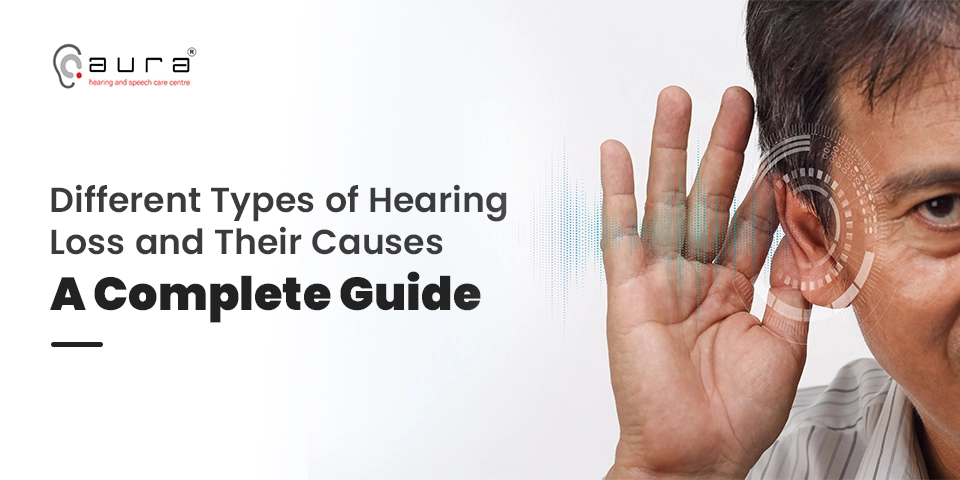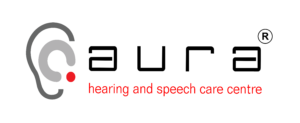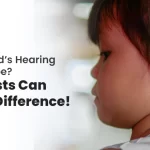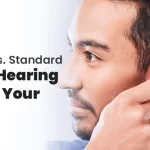
According to the report published by the World Health Organization on 26 February 2025, by 2050 over 700 million people—or 1 in every 10 people—will have disabling hearing loss. Hearing loss is a common medical condition affecting millions of people worldwide. It is caused by various factors and can be present at the time of birth or acquired at any age. Depending on the causes, there are various medications available out there to restore the hearing loss back to normal.
In this blog, we will provide a comprehensive overview of hearing loss, its causes, symptoms, and treatments available.
What Is Hearing Loss?
Hearing loss is a medical condition where a person loses the ability to hear the sound partially or completely in one or both ears. It can happen at any age or present at the time of birth (congenital hearing loss).
Types of Hearing Loss
- Conductive Hearing Loss—This condition occurs when sound waves are unable to reach the inner ear.
- Sensorineural Hearing Loss—This type of hearing loss is caused by damage to the inner ear or auditory nerve.
- Mixed Hearing Loss—This condition is a combination of conductive and sensorineural hearing loss, caused by a problem in both the middle and inner ear.
- Tinnitus (ringing or buzzing sound)—this condition is a type of symptom but can lead to hearing loss.
Common Causes of Hearing Loss
There are various factors that contribute to hearing loss, and identifying these causes is essential for early treatment:
- Genetics: It is one of the major factors that occur due to defects in the genes resulting from the genetic mutations or can be inherited from one of the parents (carrier).
- Aging: This is one of the common causes and commonly occurs in older people due to the degeneration of the auditory nerve.
- Exposure to Loud Noise: Prolonged exposure to loud noise is one of the significant factors for hearing loss. It is mainly found in people working in noisy environments like construction, factories, concerts, etc.
- Infections: Bacterial or viral infections in the ear lead to a buildup of fluid in the ear. This can lead to permanent or temporary hearing loss depending on the severity of infections.
- Medication: Certain medications like Ototoxic have a potential negative impact on hearing functioning, as they can cause damage to the ear.
6. Head Injuries: Trauma to the head or ear can damage the ear structure and result in hearing loss.
Common Symptoms of Hearing Loss
Infants/Babies:
- No startle to loud noises
- Doesn’t notice you until seen
- Ignores sounds others hear
- No response to held voice
- Malformed ear
Adults:
- Muffled Hearing
- Needs face-to-face to understand speech
- Often ignore speech
- Difficulty locating sounds
- Inappropriate volume in speech
- Ear Draining
- Feeling of pressure in ear
Treatments of Hearing Loss:
To manage the hearing loss problem, there are a few treatment options out there to improve the symptoms and quality of lives.
- Hearing aids—These devices increase sound, making communication easier. Aura Hearing Care offers a range of advanced hearing aids, including:
o Receiver In Canal (RIC): The device is compact and hidden, good for people new to hearing aids.
o Completely in the Canal (CIC): It is designed to fit completely inside your ear canal.
o Invisible in Canal (IIC): This is a minimal device, almost totally hidden, with just a tiny part to help take it out.
o In the Canal (ITC): Fits partly in the ear canal, with a small portion showing.
o In the Ear (ITE): This is a personalized hearing aid, designed to fit the outer ear for comfort.
o Behind the Ear (BTE): This device is the most used type and is available in different sizes.
- Cochlear implants—This device is surgically implanted and is used to treat severe hearing loss.
- Sign language—This is a visual way of communication for those with profound hearing loss.
- Assistive devices—These devices are used to improve the daily activities of a person. Tools like amplified phones and alerting systems are most commonly used.
Conclusion:
The prevalence rate of hearing loss is increasing worldwide due to genetic disorders and environmental factors. To manage this condition effectively, it is important to understand the causes and identify the symptoms for early treatment. If you experience any of the above symptoms or have blurred vision, then seek medical help immediately. Early diagnosis is very important to treat the condition and maintain healthy hearing.
If you are looking to improve your hearing and life. Explore effective solutions with Aura Hearing Care and find the right solution for your needs.
1. What is hearing loss?
Hearing loss is a medical condition where a person loses the ability to hear sound partially or completely in one or both ears.
2. Can hearing loss be cured?
Depending on the causes, the treatments vary; however, various treatments like hearing aids, cochlear implants, and assistive devices can help improve hearing and communication.
3. What are the treatment options available for hearing loss?
Treatments like hearing aids, cochlear implants, speech therapy, sign language, and assistive listening devices are available in the market to enhance communication.
4. How can I book a consultation with Aura Hearing Care?
You can book an appointment with Aura’s hearing specialists through the website (Types of Hearing Aids | Find the Best Fit for Your Needs) or visit a nearby branch for an in-person hearing assessment.







